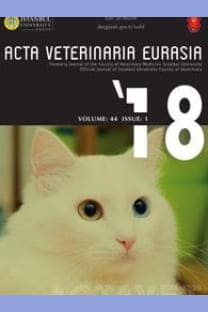Positions of Food Business Operators in Bosnia and Herzegovina toward HACCP System
Gıda Hijyeni Mevzuatı, HACCP, gıda operatörü, Bosna ve Hersek
-
Food Hygiene Legislation, HACCP, food operators, Bosnia and Herzegovina,
___
- Cerf, O., Donnat, E., 2011. Application of hazard analysis – Critical control point (HACCP) principles to primary production: What is feasible and desirable? Food Control 22, 183918
- Deodhar, S.Y., 2003. Motivation for and cost of HACCP in Indian food processing industry. IIM-A Working Paper No. 2003-05-03.
- Maldonado, E.S., Henson, S.J., Caswell, J.A., Leos, L.A., Martinez, P.A., Aranda, G., Cadena, J.A., 2005. Cost–benefit analysis of HACCP implementation in the Mexican meat industry. Food Control 16, 375-381.
- Motarjemi, Y., Käferstein, F., 1999. Food safety, Hazard Analysis and Critical Control Point and the increase in foodborne diseases: a paradox? Food Control 10, 325-333.
- Muth, M.K., Karns, S.A., Wohlgenant, M.K., Anderson, D.W., 2002. Exit of meat slaughter plants during implementation of the PR/HACCP regulations. Journal of Agricultural and Resource Economics 27, 187-203.
- Muth, M.K., Wohlgenant, M.K., Karns, S.A., 2007. Did the pathogen reduction and Hazard Analysis and Critical Control Points regulation cause slaughter plants to exit? Review of Agricultural Economics 29, 596-611.
- Ponte, S., Nielsen, J.R., Campling, L., 2005. Trade and competitiveness in African fish exports: Impacts of WTO and EU negotiations and regulation, TRALAC TradeBrief No. 5/2005.
- Roberto, C.D., Cardoso Brandão, S.C., Barbosa da Silva, C.A., 2006. Costs and investments of implementing and maintaining HACCP in a pasteurized milk plant. Food Control 17, 59960
- ISSN: 2618-639X
- Başlangıç: 1975
- Yayıncı: İstanbul Üniversitesi-Cerrahpaşa
KEÇİLERDE UTERUS İNVOLÜSYON ULTRASONOGRAFİSİ
Investigations on Liver Function in Mulards with Experimentally Induced Aflatoxicosis
Nely GROSEVA, İvan VALCHEV, Rumen BINEV, Dian KANAKOV, Tsanko HRISTOV, Lazarin LAZAROV, Krasimira UZUNOVA, Yordan NIKOLOV
Kars İlinde Satışa Sunulan Dondurmalarda Aflatoksin M1 Varlığının Belirlenmesi
Çiğdem SEZER, Aksem AKSOY, Leyla VATANSEVER, Nebahat BİLGE
Kayseri İlinde Satışa Sunulan Manda Yoğurtlarının Mikrobiyolojik Kalitesi
Nurhan ERTAŞ, Serhat AL, Fulden KARADAL, Zafer GÖNÜLALAN
KOYUN ÇİÇEĞİ VİRUS SUŞLARININ MOLEKÜLER KARAKTERİZASYONU
Mustafa HASOKSUZ, Veli GULYAZ, Fahriye SARAC
İsmail KIRŞAN, Özge TURNA YILMAZ, Murat ÖZHAVALA
Kekik Uçucu Yağının Ruminant Beslemede Kullanımı
Dimitar KOSTOV, Rosen DIMITROV, Kamelia STAMATOVA-YOVCHEVA, Alexandar ATANASOV, Penka YONKOVA, Diana VLADOVA, Radoslav MIHAYLOV, David YOVCHEV
Rosen DIMITROV, Diana VLADOVA, Kamelia STAMATOVA-YOVCHEVA, Penka YONKOVA, Dimitar KOSTOV, Miroslav STEFANOV
Appraisal of Transfer of a Few Crucial Minerals from Forage to Ruminants: A Case Study in Pakistan
Zafar KHAN, Kafeel AHMAD, İrfan MUSTAFA, Alireza SEDAVI, Abrar HUSSAIN, Mhuammad SHER, Mhuhammad AYUBE, Muhammad YOUSAF, Ameer ZAHOOR, Ghulam HUSSAIN, Anbreen ANNJUM
